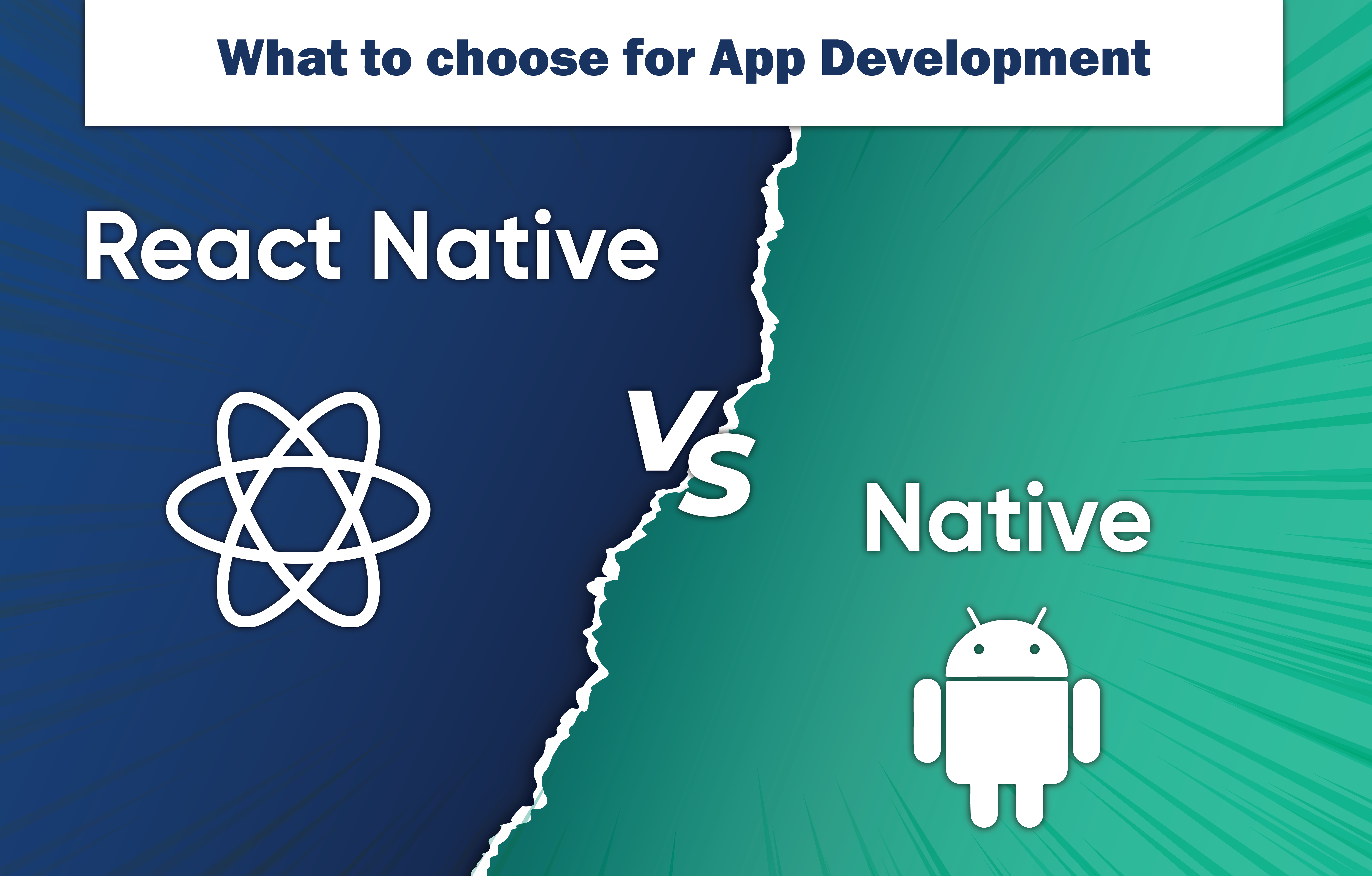It’s been a long-standing practice for mobile app development companies to use every framework, library, and technology they could find when developing an application to boosting the user experience for years. In today’s world, creating an app is not a difficult task. ReactS and React Native is often used to build mobile apps.
React Native and native have been at war for a long time as some firms prefer to use React Native, while others only use native. However, it is undeniable that React Native and native are two of the key players on the market in the field of app development.
Many people who were previously developing native apps have switched their attention towards React Native as it allows them to develop cross-platform applications. Based on the 2022 Developer Survey by StackOverflow, React Native outperforms Google’s Flutter, Microsoft’s Xamarin, and Adobe’s Cordova.
Below you’ll find a guide explaining the best choice when developing a mobile app: Native or React Native. The process will not be as simple as flipping a coin. Now let’s get into the details:
What is React Native App Development?
React Native App Development lets you use your existing coding skills to increase efficiency. It improves performance and reduces the cost of app development – a great benefit for clients and any company developing mobile apps.
An internal hackathon hosted by Facebook in the summer of 2013 led to the creation of the React Native JavaScript framework. As a result, open-source technology has become quite popular in recent years.
What is Native App Development?
A native approach to app development involves the creation of apps that are coded in a language that is specific to a specific platform. The tools used by these companies are not only advanced but also offer the best performance and provide the best look and feel that you cannot get with cross-platform app development.
Several apps have used native app development, such as Twitter and Telegram. Several Apple products and Google products also use this technology.
Factors to consider while deciding on the right app development approach
Here are some top factors that you need to keep in mind when choosing react native and native for the app development approach:
The development time for a mobile application
React Native takes way less time to develop a mobile application. First, a mobile app development company must have two teams, one for the android version and one for the iOS version. React Native eliminates the need to consider more than one team and their time alone. It is also nice to note that whenever the code is changed, you will not have to rebuild and run the entire project every time you make a change as you do in Native.
Using React Native technology, you can perform a Hot Reload and a Live Reload. This allows coders to observe and test changes immediately after they are made.
Total Cost for developing a mobile application:
Native app development has the main problem of being extremely expensive. In Native, most things must be done twice if you’re targeting Android and iOS.
The application must work, so you must have separate development teams and a testing and deployment pipeline. Managing and preparing both teams that need to work together in sync increases by two to three times the labor costs.
React Native is an excellent tool for reducing all of these costs to a considerable extent.
UV/UX Experience

As a result of the React Native framework, developers can reuse the core code and write platform-specific code independently of one another. While it’s possible to create a complex user interface with custom views, navigation patterns, seamless transitions, animations, etc., it’s equally as challenging to create one with custom views.
By using Native, you will be able to access all Native APIs. The smartphone’s capabilities include a camera, a GPS, and the ability to build animations and complex user interfaces.
However, complex animations and Uls are not React Native’s strongest suit when it comes to performance. While it does have the Animated API, which is a nice option, it is still lacking in comparison to the capabilities of Native.
Also Read: Which Language Is Best For iOS App Development?
Overall Performance
There is no doubt that native development is the determinant factor when comparing it to hybrid solutions. Native development is always the winner.
In the case of React Native, it is built on top of JavaScript, which uses a single thread on the device. At the same time, it cannot run several asynchronous tasks.
While native apps work with advanced features, do complex calculations, and integrate advanced hardware devices, Swift, Java, or Kotlin are considered superior to JavaScript. With Native technology, developers can build any form of the mobile app.
Scalability
With React Native, you can reuse code, which improves scalability over Native. If a company opts for the Native approach, they would have to hire more developers, spend more time, and spend more money, but React Native does not require that many.
A further benefit of React Native is its cross-platform approach, which provides app developers with a host of options and features that facilitate the process of quickly doing a lot of work.
Pros of Choosing Native App Development
A business can benefit from many iOS and Android advantages when they choose Native mobile app development frameworks. As far as functionality, accessibility, and performance are concerned, native apps are always superior to others. Native frameworks have the following advantages:
1. System-specific Scalability
Native apps have always performed well compared to React Native since they are exclusively designed for one platform. A mobile app developed on a dedicated platform tends to have more straightforward integration, less code writing, easier debugging, and a better user experience. Unlike other apps, the created app does not rely on any other platform.
2. High-end Security

Native applications are based on the system’s operating system, securing the users’ data. You must hire mobile app developers who can deliver native applications with such security features to your company.
Pros of Choosing React Native App Development
The React Native framework allows developers to build cross-platform fast, scalable, and lightweight applications while saving time and effort. Facebook created this framework in 2015 to efficiently build apps and take advantage of all the native features. The app is currently used by various popular apps, including Instagram, Airbnb, Walmart, etc.
Here are some more benefits of React Native:
1. Quick Development Time
Due to React Native’s amazing benefits, such as less effort and fast development time, the developer community prioritizes it over Native mobile app development.
Using this open-source app development framework does not have to write the same code twice, thus saving you a lot of time.
This will save the developers 40% of their time. As a result, they save a lot of time, as well as the effort they have to put into writing different pieces of code for different platforms.
2. Cross-platform Development
React Native does not need to write different codes for different platforms. A single code would go for both platforms, Android and iOS. JavaScript is much easier to use and maintain than any other programming language. It directly saves a lot of effort and development duration.
When is Native App Development Right for You?
When it comes to native app development, it makes sense under the following circumstances:-
- Especially if you are building a complex Messenger application.
- It’s time to launch your regular update.
- It is more of a native user experience that you are focusing on.
- This is a utility app that relies on native device features. An example is a Brightness Controller or a background video player application.
- The app you are building is IoT-based.
- You are developing an app for a particular platform.
Choosing React Native for Mobile App Development
Mobile app development with React Native is ideal in the following scenarios:-
- The application you are creating is simple and uniform.
- Cross-platform app development is what you need.
- Your app development budget is lower.
- Getting into the market as soon as possible is what you want.
- An app like Facebook or Instagram is what you are creating.
- Facebook ads are something you look forward to using in your app.
- You are creating an e-commerce application.
- Although it is up to you to make the final decision, we recommend choosing React Native for startup applications for the following reasons that prove how valuable React Native is in enabling startups to enter the mobile space when they are just starting.
Choosing React Native over other options for startups
To clarify things for you, we will look at the different challenges faced by startups when developing mobile apps and how this technology can be a viable solution for them.
1. There’s no target audience
For startups to gain the highest return on investment, it is important to identify the right target audience and the right market. Many businesses are still pondering the question, “Android vs. iOS: Which Platform is best for Mobile Startups? ” Fearing that their users might not be using the platform they are targeting.
With React Native, Facebook allows them to target both platforms simultaneously.
2. Increased effort
Hiring two separate teams for Android and iOS app development is nearly impossible for startups without technical expertise. The hiring process takes extra time, which makes it hard for them to focus on other aspects of their business.
Developing React Native apps eliminates the need for two separate teams, which is the answer to this startup challenge.
3. Limited Funds

In comparison to native app development, React Native app development is more affordable. Despite having limited budgets, startups can enter the mobile industry through this method.
4. Having a difficult time launching
As the market becomes more competitive, startups must decide when and how to launch mobile applications on Android and iOS platforms and gain a higher return on investment. In this scenario, React Native helps them launch a mobile app that can run on smartphones and tablet computers at the earliest possible time.
With React Native, startups can get the right assistance and solutions to scale their business.
Different Brands Already Working With React Native
Numerous famous brands have already started using React Native to meet their specific needs in the market. Here are a few examples of apps that have been developed using React Native:-
1. Facebook

Facebook aimed to bring web development benefits to mobile devices like quick iterations, a single team, etc.
2. Walmart

By using fewer resources, Walmart wanted to improve the app’s performance and customer experience on Android and iOS platforms. To gain a competitive advantage in the marketplace, they invested in React Native app development, thus reusing 96% of the codebase between the two platforms.
3. SoundCloud
It is also worth noting that the SoundCloud app is also made with React Native.
When SoundCloud planned to create an iOS version of its service, it encountered several challenges that it had to overcome. In their search for a good iOS app development team, they found they could not find any, so they wanted their app for both platforms almost simultaneously. Using the React Native platform, they can launch their app on both platforms easily without having to hire any specialized developers to launch the app on both platforms.
4. Bloomberg
Bloomberg is another company that has invested in developing React Native apps. Keeping up with the market and meeting the needs of their consumer mobile app, Bloomberg switched to React Native.
5. Wix

Wix allows the user to create HTML5/mobile websites using the drag-and-drop facility, which is especially useful for users unfamiliar with coding or who have no idea where to start.
Due to its characteristics, such as hot reload, higher speed, and agility while developing web applications and native results, React Native fits well into their ideology.
Their development team has reported that with React Native, they have been able to speed up their development process by 300%, according to their source code.
Here You Can Read More about Startup App Development
Frequently Asked Questions
Is React Native considered a native app?
No, it isn’t a native app. Usually, React Native apps are usually designed to be compatible with Android and iOS platforms. For a more in-depth knowledge of React Native, you may consult a renowned company specializing in developing mobile apps.
How do react Native and native differ?
Regarding the debate between React native apps and native apps, React native is better for any type of app. However, when you’re unsure who your target audience is, have a limited budget, are incapable of investing more effort, or aren’t sure which platform to launch it on.
Does react native run slower than native apps?
In no way is it slower than native applications.
React native is a hybrid, or is it a native?
A React Native application is neither a native nor a hybrid app, and it’s more of a cross-platform framework. In other words, it develops apps that work on both Android and iOS.
Conclusion
The world is full of mobile applications; native and React Native are two of them. React Native has become popular after Native as a cross-platform app development option. However, these are necessary and beneficial but React Native has made the process of delivering mobile apps more efficient in terms of resource usability, communication, budget, and other factors. Also, the best framework for mobile app development will depend on the needs of each business.
It doesn’t matter what framework you use, Native or React Native since SynergyWorks Solutions can handle them both. Having developed mobile apps for years, we are at the top of the industry. Contact us today for your next app development project.
About Author
Shikha Taman
Shikha Taman is the founder & CEO of SynergyWorks Solutions. With over 12 years of experience in the industry. She has extensive knowledge of software engineering, project management, client management, and business strategy. She strives to ensure all the products developed are always up-to-date with materializing technologies to remain competitive in today’s marketplace.




